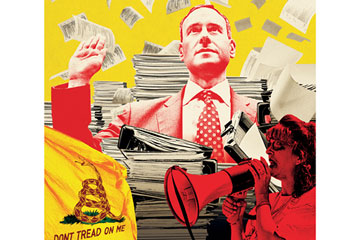
How the agency everyone hates went rogue.
(2 of 3)
Shulman was wrong, and his words helped conceal the largest political scandal at the IRS since the Nixon era. An explosive inspector general report released May 14 revealed that the agency had, starting in March 2010, systematically flagged nonprofit applications from groups whose names included words like Tea Party and Patriots. By June 2011, groups that addressed "government spending, government debt and taxes" were flagged, along with groups that criticized "how the country is being run." (Liberal-leaning groups, by contrast, were sometimes identified for further investigation but less systematically.) An IRS supervisor tried to correct the problem in July 2011 by mandating equal treatment for all potentially political groups, but the trouble persisted: more junior officials went rogue last year, returning to the narrower guidelines in the name of efficiency.
The flagged applications landed in a Kafkaesque netherworld of inaction. The IRS lacked a clear process for handling them, leading to a near parody of bureaucratic confusion. In October 2010, the IRS determinations unit in Cincinnati requested guidance on how to proceed with reviewing the groups from the technical unit in Washington, which was supposed to coordinate with the guidance unit. It took 13 months for these obscure units to devise a response, a delay the director of yet another division in Washington, called rulings and agreements, later explained away as a "miscommunication." By February 2013, after 27 months and two election cycles, the guidance had still not been finalized. In the meantime, dozens of groups had been forced to function without official approval while juggling inappropriate requests for more information.
All the while, the American principle of equal protection was distorted in an election year. The question now is not if an injustice was committed but whether the motivations were malicious. The IRS claims the story is not about political persecution but mismanagement and poor judgment. "We believe the front-line career employees that made the decisions acted out of a desire for efficiency and not out of any political or partisan viewpoint," wrote Joseph Grant, acting commissioner of the IRS tax-exempt division. IRS officials told the inspector general that no one outside the agency, including at the White House, had any role in deciding the criteria for investigating applications.
Those statements will not be the final word. Four congressional committees have announced investigations, promising months of sworn testimony and subpoenas. The FBI has also launched its own criminal investigation. On May 15, President Obama forced the resignation of the IRS's acting commissioner, Steven Miller. "I am angry about it," Obama said. "I will not tolerate this kind of behavior." Republicans want more. "My question isn't about who is going to resign," said House Speaker John Boehner. "My question is 'Who is going to jail over this scandal?' " Probably no one, as it's not clear that any specific laws were broken.
